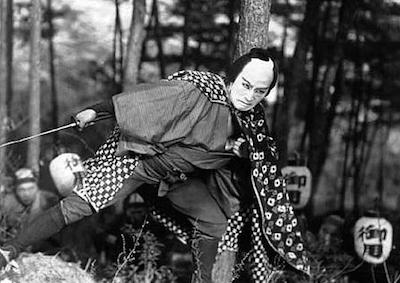Blood Spattered Takadanobaba (Japan, 1928)
Chikemuri Takadanobaba
Star Ōkōchi Denjirō and director Itō Daisuke helped remake the chambara genre in the late 1920s, infusing it with visual flash and mythic power. Sadly, the films of theirs that survive exist mostly in fragmentary form. Such is the case with Blood Spattered Takadanobaba. In this brief scene, the ronin Yasube comes home drunk to a letter from his uncle requesting assistance fighting off a band of villainous samurai. Yasube races to his uncle’s side and joins the battle already in violent progress! So that audiences can experience more directly how a benshi’s specific style can influence a film, Blood Spattered Takadanobaba will be repeated over the course of this series with a different benshi narrating each time.
Narrated by benshi Kataoka Ichirō.
Print courtesy of the National Film Archive of Japan. 35mm, b/w, silent, intertitles in Japanese with English subtitles, 7 min. Director/Screenwriter: Itō Daisuke. Cast: Ōkōchi Denjirō, Jitsukawa En'ichirō, Ichikawa Harue.
The Sword that Slashes Human and Horse (Japan, 1929)
Zanjin zanba ken
Shochiku studios had introduced the term jidaigeki, that is “period drama,” into the Japanese theatrical marketplace in the early 1920s to describe and differentiate two of its films, Shimizu Jirocho and Woman and Pirates, both written by Itō Daisuke. While it launched the period drama, Shochiku didn’t pursue it, letting Itō go to Nikkatsu studios, where, as a director he revolutionized the genre with his own energetic take on the chanbara film. In a bid to make up lost ground, Shochiku lured Itō back with an unprecedented budget to shoot The Sword That Slashes Human and Horse about a ronin who comes to the aid of rebellious farmers against a corrupt feudal lord. As with Blood Spattered Takadanobaba, this short fragment will be repeated over the course of this series with a different benshi narrating each time.
Narrated by benshi Ōmori Kumiko.
Print courtesy of the National Film Archive of Japan. 35mm, b/w, silent, intertitles in Japanese with English subtitless, 26 min. Director/Screenwriter: Itō Daisuke. Cast: Tsukigata Ryūnosuke, Seki Misao, Ishii Kanji.
A Diary of Chuji's Travels (1927)
Chūji tabi nikki
In 1959, Japanese film journal Kinema Junpo named this epic chambara, that is “sword fighting” film, the best Japanese film of all time for the thematic and kinetic innovations writer-director Itō Daisuke brought to the story of the outlaw hero. Originally four hours long, this surviving version takes up the exploits of gambler Chuji in media res as he defies strict social norms and fights to save the geisha Oshina.
Narrated by benshi Sakamoto Raikō.
Print courtesy of the National Film Archive of Japan. 35mm, b/w, silent, intertitles in Japanese with English subtitles, 111 min. Director/Screenwriter: Itō Daisuke. Cast: Ōkōchi Denjirō, Naoe Fushimi, Ranko Sawa.






 Mobile Navigation
Mobile Navigation

